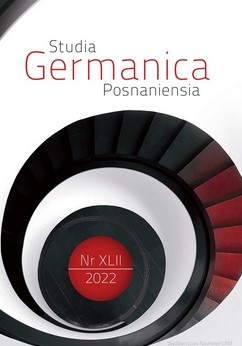ZUR FRAGE NACH DEM MENSCHLICHEN IM ZEITGENÖSSISCHEN THEATER – EIN DIFFRAKTIVES LESEN VON „STILL LIFE. A CHORUS FOR ANIMALS, PEOPLE AND ALL OTHER LIVES“ (MARTA GÓRNICKA, 2021) UND „DIE KRÄNKUNGEN DER MENSCHHEIT“ (ANTA HELENA RECKE, 2019)
ON THE QUESTION OF THE HUMAN IN CONTEMPORARY THEATRE – A DIFFRACTIVE READING OF “STILL LIFE. A CHORUS FOR ANIMALS, PEOPLE AND ALL OTHER LIVES” (MARTA GÓRNICKA, 2021) AND “DIE KRÄNKUNGEN DER
MENSCHHEIT” (ANTA HELENA RECKE, 2019)
Author(s): Karina ROCKTÄSCHELSubject(s): Theatre, Dance, Performing Arts, Aesthetics, Social Philosophy
Published by: Uniwersytet Adama Mickiewicza
Keywords: Marta Górnicka; Anta Helena Recke; still life; Die Kränkungen der Menschheit; posthumanism; theatre; anti-humanism; non-human;
Summary/Abstract: The essay examines two examples from contemporary German-speaking theatre in relation to aesthetics of the posthuman. Although theatre is made by and for humans, I show how both examples interrogate and ultimately negate a historical configuration of the human and of humanity. In Marta Górnicka’s Still Life (2021 Maxim-Gorki-Theater, Berlin) and Anta Helena Recke’s Die Kränkungen der Menschheit (2019 Münchner Kammerspiele, Munich), the question of the human is negotiated differently but aesthetically similarly – namely with a many-voiced chorus. While Gornicka’s production performs an indictment of Western, Eurocentric humanity and its violent exclusionary practices, Recke’s production performs a – if not the – insult of a Eurocentric conception of humanity through a performance by a choir of women of colour who are not bound to Western aesthetic norms and their epistemic embedding. Both productions use aesthetic strategies that demand worlds “after” the Eurocentric figuration of the human and can therefore be described as “aesthetics of the posthuman”.
Journal: Studia Germanica Posnaniensia
- Issue Year: 2022
- Issue No: 42
- Page Range: 161-178
- Page Count: 18
- Language: German

